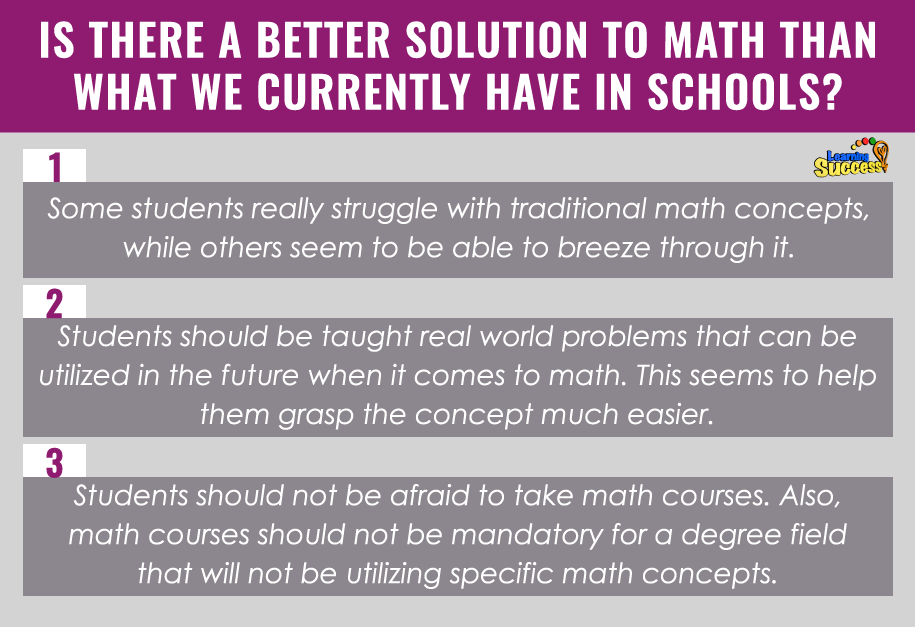
With the rise of remedial math failure, there have been new ideas on how to teach math in a way that benefits everyone. One idea allows students to reduce math anxiety by helping them relate to and truly understand it.
Is college-level math a necessary skill?
Many students shy away from math, because at first try they don't think they're good at it. Unfortunately, this can have devastating effects on a person.
Hundreds of students fail state-mandated tests each year, resulting in some being held back a year, and others having to take extra remedial classes when they get to college. This leaves many high school students finding themselves ill-equipped for college before they even get there, not to mention having further struggles in college-level algebra.
Consequently, the fear and anxiety of math and their math performance hinders their ability to acquire basic math skills, possibly leading to an adulthood of financial devastation. Not everyone will need to know how to do algebra or calculus, but basic math is important for almost everyone.
Yet, for years, high demand professions such as licensed vocational nurses, dental hygienists, or ultrasound technicians have not required intensive algebra skills. This realization of the current job market has community college educators questioning the necessity of their current "one-size-fits-all" model in the form of general education.

Finding alternative ways to teach math
This problem has led to teachers looking for alternative ways to teach math. In most general education, students do not develop an understanding of the underlying concepts. These programs, by contrast, aim to build math intuition.
At Big Bend Community College, teachers have found that programs focusing on the grounded aspects of math are a perfect way to keep students engaged. They even allow students to participate in learn-at-your-own-pace math classes. Others have also developed a program called Quantway, which uses math skills to solve real-world problems. This helps students see how math could apply to their daily lives.
Similarly, college students have the Statway methods of teaching and presenting statistics, which allows Non-STEM degree earners to study statistics used in everyday life by analyzing polls and studies. For example, students learn how to analyze data and make inferences about the data they are reading.
One student's struggle -- and recovery!
Dena DeYoung wrote about her troubles with math, and how these alternative challenges helped her. She traces her trouble with math back to sixth grade, when a well-intended placement test showed she was smart enough to do advanced work. For several years, DeYoung did well.
When she reached high school, however, math became the class she most struggled with. Lost by the logic, and unable to imagine what she was learning would ever come into play in the real world, her math grades plummeted. DeYoung eventually dropped out of school. Finally, at age 26, she enrolled in Seattle Central's version of Statway, but with the nagging concern that she would soon hit a wall just like in high school.
But thanks to these alternative methods, she succeeded! In the first quarter, she realized there wasn't anything wrong with her. DeYoung said, "All I needed was a different approach." Seattle Central is one of 19 colleges nationally using Statway, which was developed by the Carnegie Foundation. The foundation has also developed a program called Quantway, which uses math skills to solve real-world problems.
Key Takeaways:
Embracing alternative methods is a sure-fire way to help students improve in their math skills. Learning Success System has methods to get to the root of the problem, and find out which micro-skills need strengthening to increase learning ability. Take our assessment by clicking here!
Do You Need help with a Math Difficulty?
Our simple online analysis will help you get to the core of the problem and find the right solution for you.
Understanding how to help someone with a learning difficulty starts with understanding which micro-skills are affected. When you learn which of the micro-skills is the problem, you will then be on your way to solving it.
You'll also learn how to:
- Build confidence
- Enhance Learning ability
- Eliminate avoidance
- Build grit
You can get this analysis for free by filling out this simple form. This will help you get to the bottom of a learning difficulty and provide you with a solution. If you are ready to put this problem behind you click the button below and fill out the form.










